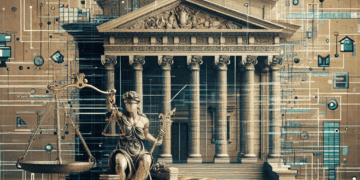No products in the cart.
A software patent is an industrial property right that relates to a computer-implemented invention. It is a controversial and complex topic in the field of intellectual property law, particularly because the patentability of software is handled differently in different legal systems and case law in this area is constantly evolving.
Key Facts
- Software patents are industrial property rights for computer-implemented inventions that have to overcome legal challenges.
- The patentability of software varies between countries, particularly in the EPC and US patent law.
- Essential requirements are technical character, novelty and inventive step.
- Advantages: Protection of innovations, competitive advantages and license income.
- Disadvantages: Inhibition of innovation, legal uncertainty and high costs.
- Companies should build a strategic patent portfolio for defense and licensing.
- The debate on software patents remains dynamic, influenced by new technologies such as artificial intelligence.
Legal basis:
1 European Patent Convention (EPC): According to Art. 52 EPC, “programs for computers” as such are excluded from patentability. However, computer-implemented inventions can be patented if they have a technical character.
2 German Patent Act: Section 1 (3) and (4) PatG excludes programs for data processing systems as such from patentability, but also leaves room for the patenting of computer-implemented inventions.
3. US patent law: In the USA, the patenting of software is generally possible, although case law has tightened the requirements in recent years.
Requirements for patentability:
1. technical character: The invention must make a technical contribution that goes beyond mere programming.
2. novelty: the invention must not belong to the state of the art.
3. inventive step: The invention need not be obvious to a person skilled in the art from the prior art.
4. industrial applicability: the invention must be capable of being made or used in any industrial field.
Examples of potentially patentable software inventions:
1. methods for improving the performance or security of computer systems
2. algorithms for data processing with a technical effect (e.g. image processing)
3. control software for industrial processes
4. encryption methods with a technical character
Advantages and disadvantages of software patents:
Advantages:
1. Protection of innovations: Patents can create incentives for investment in research and development.
2. competitive advantage: Patents can grant a monopoly position for certain technical solutions.
3. license income: Patent holders can generate additional income by granting licenses.
Disadvantages:
1. Innovation inhibition: Patents can make access to basic technical solutions more difficult and thus hinder innovation.
2. Legal uncertainty: The limits of patentability are often unclear, which leads to legal uncertainty.
3. Costs: The application and enforcement of patents is costly and resource-intensive.
4. Patent trolls: Abuse of the patent system by companies that acquire patents solely for the purpose of filing lawsuits.
Challenges in practice:
1. differentiation: It is often difficult to distinguish between patentable computer-implemented inventions and non-patentable computer programs “as such”.
2. international differences: The different handling of software patents in different countries makes the global protection of inventions more difficult.
3. fast pace: The rapid technological development in the software industry can lead to patents becoming obsolete before they are granted.
4. open source: The increasing importance of open source software is partly in conflict with the patent system.
Strategic considerations for companies:
1. patent portfolio management: Companies should carefully consider which inventions they want to patent and which they want to protect as trade secrets.
2. defensive strategy: building up a patent portfolio to defend against patent lawsuits from competitors.
3. licensing: development of a strategy for monetizing patents through licensing.
4. freedom to operate: regular review of whether the company’s own products could infringe third-party patents.
5. alternative protection strategies: consideration of other forms of protection such as copyright, trade secret protection or open source licenses.
Legal developments and outlook:
The debate surrounding software patents remains intense. In Europe, the case law of the European Patent Office and national courts has further defined the limits of the patentability of software in recent years. In the USA, Supreme Court decisions such as Alice Corp. v. CLS Bank International have tightened the requirements for the patentability of software.
Legal developments in this area are expected to remain dynamic, especially in light of new technologies such as artificial intelligence and blockchain. Companies and developers in the software industry should follow these developments closely and adapt their IP strategies accordingly.
Conclusion:
Software patents remain a complex and controversial topic at the intersection of law and technology. While they can protect innovation and promote investment, they also carry the risk of hindering technological progress. For companies in the IT sector, a sound understanding of the legal framework and careful consideration of the advantages and disadvantages of software patents is essential in order to develop an effective IP strategy.





















